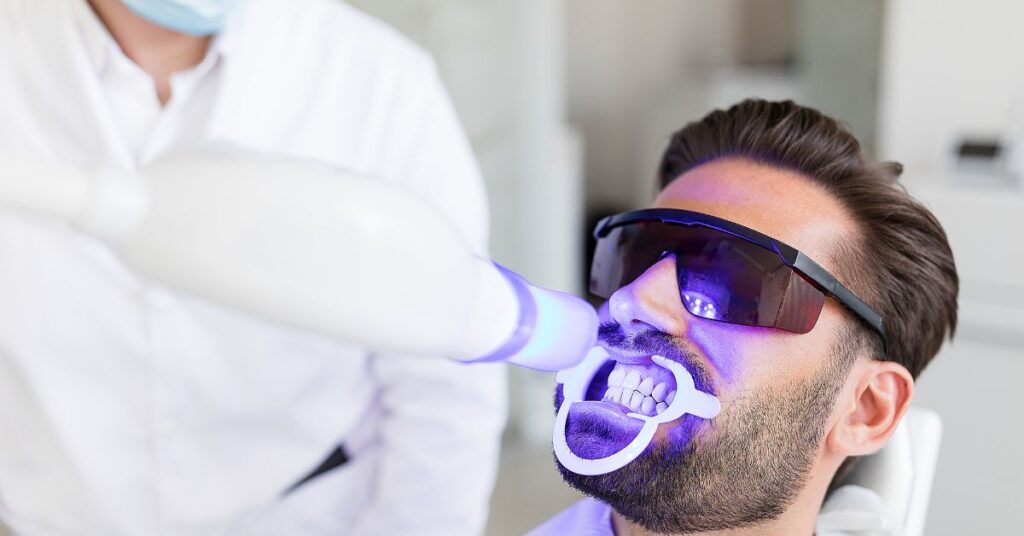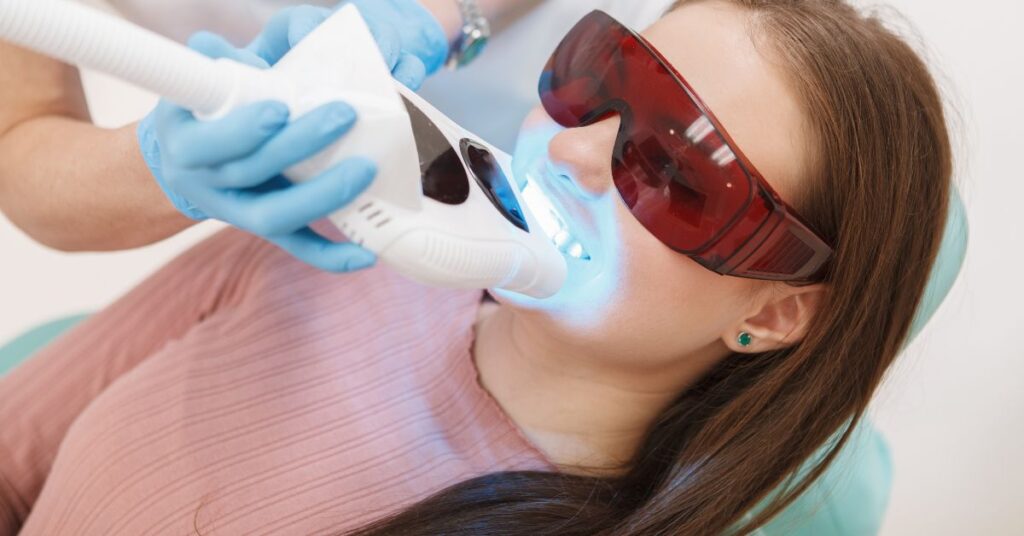
Introduction to Teeth Whitening Safety
The Concerns Around Teeth Whitening
For years, teeth whitening has been shrouded in myths and misconceptions. Some people believe that whitening products can permanently damage tooth enamel or cause severe sensitivity. These concerns have led many individuals to avoid whitening treatments altogether, even though modern techniques have significantly improved safety standards.
The Importance of Understanding Teeth Whitening Safety
With the growing popularity of teeth whitening treatments, it’s crucial to separate fact from fiction. By understanding the potential risks and benefits, you can make an informed decision about whether whitening is right for you. This guide aims to provide a comprehensive overview of teeth whitening safety, empowering you to take control of your dental health and achieve your desired smile with confidence.
The Science Behind Teeth Whitening

How Teeth Whitening Works
Teeth whitening products typically contain active ingredients like hydrogen peroxide or carbamide peroxide. These chemicals penetrate the enamel and break down stains and discoloration caused by factors like aging, food, and beverages. Whitening can be achieved through professional in-office treatments, over-the-counter products like strips or gels, or natural remedies like baking soda or activated charcoal.
The Safety of Teeth Whitening Ingredients
While the active ingredients in teeth whitening products are generally safe when used as directed, they can cause side effects if misused or overused. Hydrogen peroxide and carbamide peroxide can potentially lead to tooth sensitivity, gum irritation, or enamel damage if used excessively or without proper precautions. However, reputable whitening products from dental professionals or trusted brands use safe concentrations and provide clear usage instructions to minimize these risks.
Professional Teeth Whitening: Safety Considerations

The Benefits of Professional Teeth Whitening
Seeking professional teeth whitening services from a qualified dentist offers several advantages in terms of safety and efficacy. Dentists can provide personalized treatment plans tailored to your specific needs, ensuring that the whitening process is carried out in a controlled and monitored environment. Their expertise also allows them to identify and address any potential risks or concerns before and during the treatment.
Potential Risks and Side Effects
While professional teeth whitening is generally safe when performed by a skilled dentist, there are still potential risks and side effects to be aware of. These may include temporary tooth sensitivity, gum irritation, and enamel damage if the treatment is not administered correctly or if precautions are not taken. However, experienced dental professionals are trained to minimize these risks and provide guidance on managing any discomfort that may arise.
Over-the-Counter Teeth Whitening Products
The Pros and Cons of OTC Whitening Products
Over-the-counter (OTC) teeth whitening products like whitening strips, gels, and toothpastes offer a convenient and affordable option for achieving a brighter smile at home. These products can be effective for mild to moderate staining, but their results may not be as dramatic or long-lasting as professional treatments. Additionally, improper use or overuse of OTC whitening products can increase the risk of sensitivity and enamel damage.
Choosing Safe and Effective OTC Products
When selecting OTC teeth whitening products, it’s essential to read product labels carefully and follow usage instructions to the letter. Look for reputable brands that have undergone clinical testing and received approval from regulatory bodies like the FDA or ADA. Avoid products with excessively high concentrations of active ingredients, and discontinue use if you experience severe sensitivity or other adverse reactions.
Natural Teeth Whitening Alternatives

The Benefits of Natural Whitening Methods
For those seeking a more natural approach to teeth whitening, there are several alternatives to conventional products. Baking soda, activated charcoal, and fruit peels like lemon or strawberry are popular choices for their gentle, natural whitening properties. These methods are generally considered safe when used in moderation, but they may not be as effective as professional or OTC treatments for severe staining.
Precautions and Proper Usage
While natural whitening methods are often touted as safer alternatives, it’s important to use them with caution. Abrasive substances like baking soda can potentially damage enamel if used excessively, and acidic fruits like lemons can erode tooth enamel over time. Always consult with your dentist before trying any natural whitening remedies, and follow recommended usage guidelines to ensure safety.
Maintaining Whiter Teeth Safely
Lifestyle and Dietary Tips
Once you’ve achieved your desired level of whiteness, it’s important to maintain your results through proper lifestyle and dietary habits. Avoiding staining foods and beverages like coffee, tea, red wine, and dark-colored sauces can help prolong the effects of your whitening treatment. Quitting smoking and practicing good oral hygiene habits like brushing, flossing, and using an alcohol-free mouthwash can also contribute to a brighter, healthier smile.
The Importance of Regular Dental Check-ups
Regular dental check-ups are essential for monitoring the effects of teeth whitening treatments and ensuring the overall health of your teeth and gums. During these visits, your dentist can assess any potential side effects, provide guidance on safe whitening practices, and recommend touch-up treatments or alternative options if needed.
Conclusion
Throughout this guide, we’ve explored the science behind teeth whitening, the potential risks and side effects, and the various methods available for achieving a brighter smile. While teeth whitening is generally safe when performed correctly and under proper supervision, it’s essential to understand the potential risks and follow safety guidelines to minimize any adverse effects.
If you’re considering teeth whitening, it’s crucial to consult with a qualified dental professional. They can assess your individual needs, recommend the safest and most effective treatment options, and provide personalized guidance to ensure a safe and successful whitening experience. Remember, maintaining realistic expectations and following proper usage instructions are key to achieving and maintaining a beautiful, confident smile without compromising your dental health.
